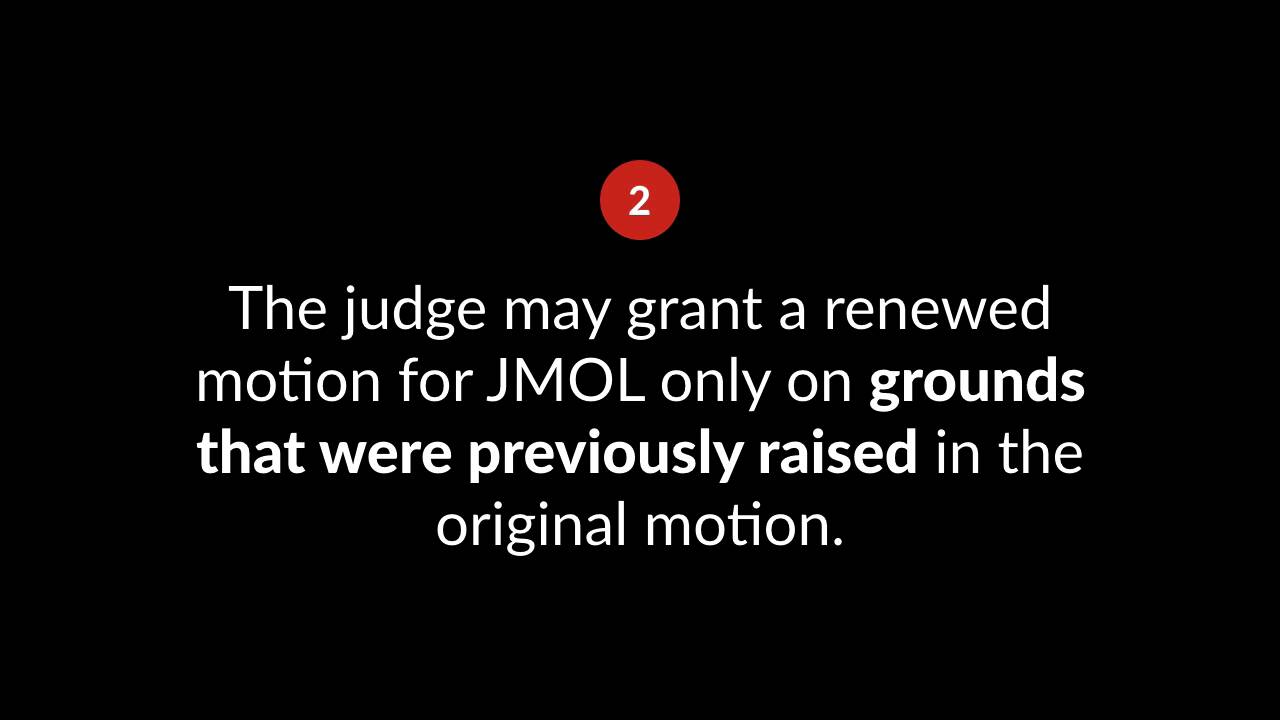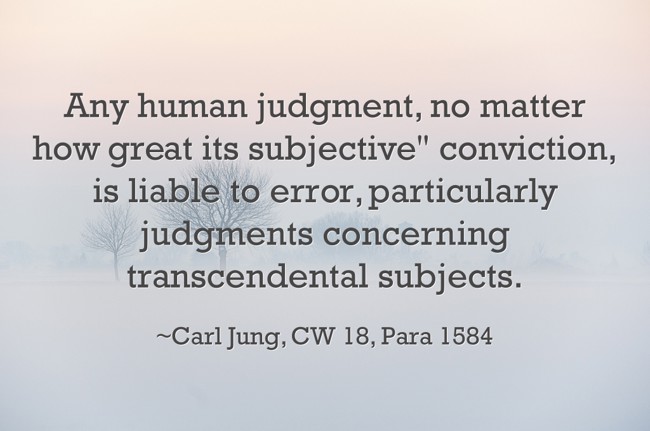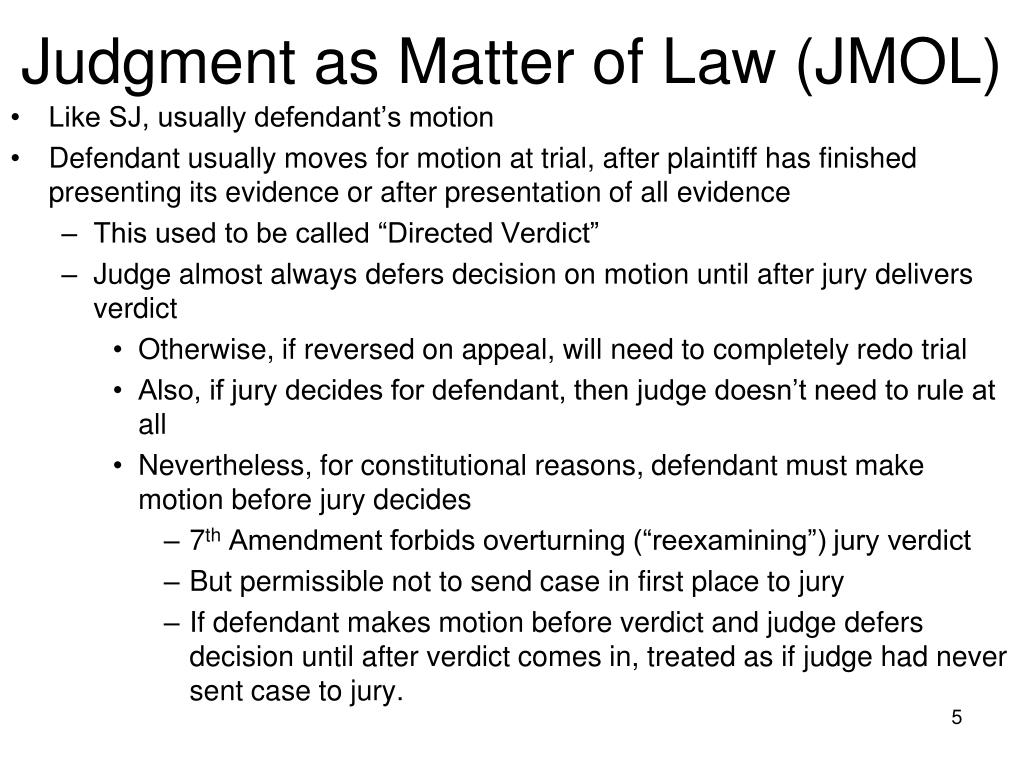
JMOL motions may also be made after the verdict is returned and are then called "renewed" motions for judgment as a matter of law (RJMOL), but the motion is still commonly known by its former name, judgment notwithstanding the verdict, or JNOV (from the English judgment and the Latin non obstante veredicto). Rule 50 Practice: Motion for Judgment as a Matter of Law 1. Renewed JMOL is decided after a jury has returned its verdict, and is a motion to have that verdict altered. However, once the defendant has finished presenting its case, both the plaintiff and the defendant can move for JMOL. Therefore, once the plaintiff has presented its case, the defendant but not the plaintiff can move for JMOL. In civil cases, the plaintiff presents its case, the defendant presents its case, and the plaintiff may present a rebuttal. Motions for Judgment as a Matter of Law (JMOL), Renewed JMOL, and New Trial. Timing is very important in making a motion for JMOL the motion can be made only after the opposing party has presented its case. This rule stipulates that the motion for JMOL is available only after the defendant presents all his/her evidence. Subject Matter Jurisdiction: Can the plaintiff file suit in federal court. If there is sufficient evidence to make a reasonable conclusion in favor of the opposing party, but there is equally strong evidence to support an opposite conclusion, the party with the burden of persuasion fails.

If there is no evidence to support a reasonable conclusion for the opposing party, judgment is entered by the court and the case is over. In legal proceedings, a judgment as a matter of law (JMOL) is a ruling by a judge that a party in the case has not met its legal burden of proof. During trial, the principal motion is a motion for judgment as a matter of law (JMOL). A motion for judgment as a matter of law (JMOL) is a request that the court issue a judgment in the movant’s favor because the evidence is legally insufficient for a reasonable jury to find in favor of the nonmovant. This rule stipulates that the motion for JMOL is available only after the defendant presents all his/her evidence. JMOL is decided by the standard of whether a reasonable jury could find in favor of the party opposing the JMOL motion. Judgment as a Matter of Law In a court proceeding, there are certain ways in which a judge may short circuit a trial, which are given below: Rule 50 (a) of the FRCP deals with JMOL. In United States federal courts, JMOL is a creation of Rule 50 of the Federal Rules of Civil Procedure. In criminal cases, a post-trial motion for judgment as a matter of law (JMOL) is a request made by the defense to the court to overturn the jurys verdict and enter a judgment in favor of the defendant.

#Judgement as a matter of law jmol trial#
Judgment on the pleadings is a motion made after pleading and before discovery summary judgment happens after discovery and before trial JMOL occurs during trial. If the motion is denied, as it usually is, the defense is given the opportunity to present its evidence.JMOL is similar to judgment on the pleadings and summary judgment, all of which test the factual sufficiency of a claim. If it is granted, the case is over and the defendant wins. JMOL is appropriate only when all the evidence points in one direction and there are no reasonable interpretations that would support the jury’s verdict. Many other devices available during and after. The judge will either grant or deny the motion. JMOL is warranted when no 'legally sufficient evidentiary basis' exists for a reasonable jury to have found in favor of a party on an issue on which the party has been fully heard. The judgment as a matter of law is one of many devices available to the judge to control the freedom of the jury. In effect, in both kinds of cases, the lawyer asks the judge to direct a verdict for the defendant.


In a criminal trial, the defendant's lawyer can ask for a motion to dismiss the charges, arguing that the government has failed to prove its case. Here denied JMOL now losing party makes the renewed motion for judgment as a matter of law - Results in a complete turn around take the victory away from. Then, when the jury leaves the courtroom, the defendant's lawyer in a civil case has the option of making a motion for a directed verdict, arguing that his or her client's liability has not been proven by a preponderance of the evidence. At the conclusion of the plaintiff's or government's evidence, the lawyer will announce that the plaintiff or government rests. judgment as a matter of law (JMOL) When the judge takes the fate of an issue or entire case out of trial before jury submission because a reasonable jury could not disagree about the verdict because a party did not meet its burden of proof after presenting all its evidence.


 0 kommentar(er)
0 kommentar(er)
